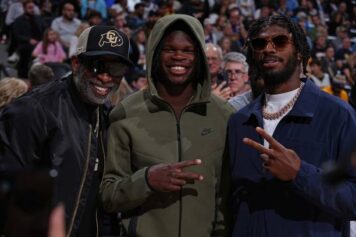Jessica Care Moore is a black institution, or at least she should be.
And like many black institutions of art, soul, and beauty, Jessica often goes overlooked for what she is, that being the heir apparent to the history of Black poetry demigods like Gil Scot-Heron, Nikki Giovanni, the Last Poets, Amiri Baraka and Sonia Sanchez. All the way through James Baldwin and Langston Hughes, back to Phyllis Wheatley and backward all the way to the dawn of pre-antiquity.
This daughter of Detroit first came to the attention of the general public when she performed Black Statute of Liberty on the stage of the Apollo Theater in Harlem. She won a record five times in a row. Recently, I had the chance to interview Jessica, stylized as jessica Care moore, prior to witnessing several soul-stirring selections from her new album at a discrete engagement at Gin Fiz in Harlem last week. In a rare but appropriate move, Javotti Media is releasing the album on vinyl, in addition to more contemporary music mediums.
Moore is a published author with numerous works, a publisher via Moore Black Press and has had her works published alongside such illuminates as Zora Neale Hurston, Maya Angelou, Alice Walker and Octavia Butler in Prentice Hall Anthology of African American Womens Literature by Valerie Lee. A giant walking silently among us, it was my pleasure to interview Jessica Care Moore.
Im a daughter of the Black Arts Movement, without question. I come from a very rich literary tradition and definitely an oral tradition, which for our people are very much intertwined. We have the grios who tell our story. I grew up in Detroit and, besides Hip-Hop, my first introduction on how we can tell stories was through poetry and music. I learned about by reading Amiri Baraka, Sonia Sanchez and Nikki Giovanni and all of the writers from the Harlem Renaissance. I was a young, very fast reader when I was a little girl, like my mother. I was surrounded by books in my house. Me and my mother would eat books.”
Publishing, performing live, as well as making appearances on works by Nas and Talib Kweli and her myriad of activism actions, it took over a decade to complete this album.
It took me a long time to record this album Black Tea: The Legend of Jessi James, but I have recorded with other people. Ive recorded with Nas on his album, Ive recorded with the Last Poets, Ive recorded with Antonio Hart, who was on Impulse back in the day. Ive done a lot of rock and roll, drum and bass, experimental music with Black Women Rock. I just was trying to figure out sonically what can be the best thing to happen with my voice and music. I just didnt want to throw my poems over Hip-Hop beats. That was just too easy. It wasnt interesting to me. I heard other poets and people who call themselves spoken word artists do it, and I never liked the CD enough to want to play the whole thing. By the second track in Im like Alright that was cool but now let me skip to the track that I like. The person who did that well was Ursula Rucker, my sister. Ursula did it right.”
Im just trying to make my father Gil Scot-Heron proud, and the Last Poets proud and Sonia Sanchez proud. I also heard Jane Cortez with a live band and I was like There I go! You know, just looking for models. Looking for people who were doing this well. Saul Williams has done it with poetry and music. It is difficult to find a balance and I think this album has actually found a space that sounds sonically good and the music has to be correct.Javotti Media is owned by Talib Kweli, someone who Moore has been kindred with for nearly two decades. Black Tea also features contributions from the incomparable Roy Ayers, Jose James, One Belo, Ursula Rucker, and Talib Kweli himself.My friendship, and now my business partnership, with Talib Kweli has just been very monumental and very important for me, very meaningful for me that someone Ive known for such a long time could find it important to help me push my voice on to a bigger platform. And theres not a lot of MCs that do that for women.
Music is timing, rhythms and vibrations, Black Tea co-producer Jon Dixon of Underground Resistance is skilled in the that sonic alchemy.
Theres coding in it. Jon is with Underground Resistance so hes always been using code in his music. Theres a song called “Balance” and we just took notes based on the word balance. For me, I wanted to have a blues feel, but its also jazz and its also soul. The whole point of the record is it has to touch people. Poetry can move people without any music. I dont need music to be able to move a crowd or to make people feel. I can do that solo. The music has to be beautiful and to touch people in a way that is transformative. That was the difficult part. My words can stand on their own. If Im going to have music with words, then the music has to stand on its own. This music is good instrumentally, without my words on it. This music is beautiful.
Here’s the complete tracklisting for Black Tea: The Legend of Jessi James
- Intro to Jessi James Prod. by Jessica Care Moore
- Walking Up 158th St (ft. Alicia Renee aka Blue Eyes)- Prod. by Jon Dixon
- Pieces (ft. Ideeyah) Prod. by Jon Dixon
- Deep Breath (ft. One Belo)- Prod. by Jon Dixon
- You Want Poems (ft. Jose James and Roy Ayers) Prod. by Jon Dixon
- Poem Before The End Of The World (ft. Alicia Renee aka Blue Eyes)- Prod. by Kenny Watson
- It Ain’t Like We Dont (ft. Paris James)Prod. by Paris James
- I Catch The Rain (ft. ursula rucker and Imani Uzuri)-Prod. by Sean Blackman
- Wild Irish Rose (ft. Ideeyah)-Prod. by Jessica Care Moore
- Catch Me If You Can (ft. Talib Kweli)-Prod. by Brady Watt and Decap
- Balance (ft. Ideeyah) Prod. by Jon Dixon
- This Is A Bus With Wings Prod. by Jon Dixon




